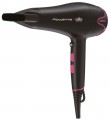—
Joint. In models with joint adjustment of power and “degree” of air flow, the parameters change at the touch of a button. Hair dryers usually have several fixed values of blowing intensity and air temperature.
—
Separate. Separate heat and temperature controls give you more freedom of choice when using your hair dryer and styler. The parameters of the flow force and temperature for hair dryers with separate adjustments change separately, which allows you to count on the optimal values of power and “degree” of blowing to avoid overdrying your hair.
Type of outer coating of the heating element.
— Chrome plated. The most basic and widely used coating option is chrome. It is affordable and heats up quickly. However, using chrome-coated heaters can pose a higher risk of hair damage, so caution is needed when using them. Due to this risk, chrome-coated nozzles are not ideal for frequent or continuous use.
—
Aluminium. Such heaters are considered more advanced than the chrome ones described above, due to a longer service life and better heat distribution. However, it is not without the characteristic drawbacks of any metal coating, primarily the negative impact on the condition of the hair.
—
Titan. Another option for a metal heater. In terms of basic properties, it is almost completely similar to aluminium (see above), in most cases it differs only in appearance.
—
Ceramics. The main advantage of ceramics is the better distribution of heat than in metal heaters. Due to this, such a coating is considered much more “gentle”; however, its cost is noticeably higher, and heating is slower.
—
Tourmaline. In most cases, when referring to a ceramic heater, it is typically combined with a tourmaline coating. This coating serves two primary functions: ionization, which promotes smooth and even styling, and friction reduction, allowing the cur
...ling iron to glide through the hair effortlessly.
— Titanium ceramics. A specific type of ceramic coating used by some manufacturers. The design, usually, implements various additional technologies designed to improve the quality of work; however, whether such devices outperform "ceramic" analogues depends on the model in each specific case.
— Titanium-tourmaline. An analogue of the tourmaline coating described above, in which titanium is used as the base of the heater instead of ceramic. There is practically no difference in the main features.
— Steel. The most basic and common coating option is "ordinary metal plating," typically referring to steel. The main advantage of this surface is its low cost. However, the heating can be uneven and harsh, which demands careful handling of the tool and makes it less suitable for frequent use.
— Teflon. Teflon stands out for its low friction, making plates glide effortlessly through the hair, even more so than ceramic ones. However, in terms of heating uniformity, it slightly lags behind ceramics.
— Copper silicon. Typically, the reference is made to silicon-coated copper plates. Copper offers excellent thermal conductivity, ensuring uniform heating, while silicon provides practical properties similar to ceramics, such as a gentle effect and suitability for frequent use. However, this option is relatively specific and does not offer significant advantages over more traditional materials, which is why it is relatively rare.
— Manganese-copper. The manganese-copper coating on the heating plates offers a very gentle effect on the hair. These flexible plates allow the styler (straightener or curling iron) to adapt to the shape of the hair strand, reducing mechanical stress on the hair and minimizing damage. As a result, the hair becomes more manageable and obedient.The ability to remove the protective grille of the hair dryer without special tools and skills, by the user himself.
The grill serves as a protective cover for the air intake of the hair dryer, located on its back side. It plays a crucial role in safeguarding the fan and heating element from foreign objects and preventing direct contact with the blades or heated coil, ensuring user safety. Additionally, the grill can accommodate an extra air purification filter, benefiting both the user and the device's internal components.
The removable design of the grill greatly simplifies maintenance and repair tasks. Users can easily clean the grill and internal elements from dust and contaminants, replace or clean the filter, and fix minor issues. However, for more complex repair work, it is advisable to seek assistance from specialists.

